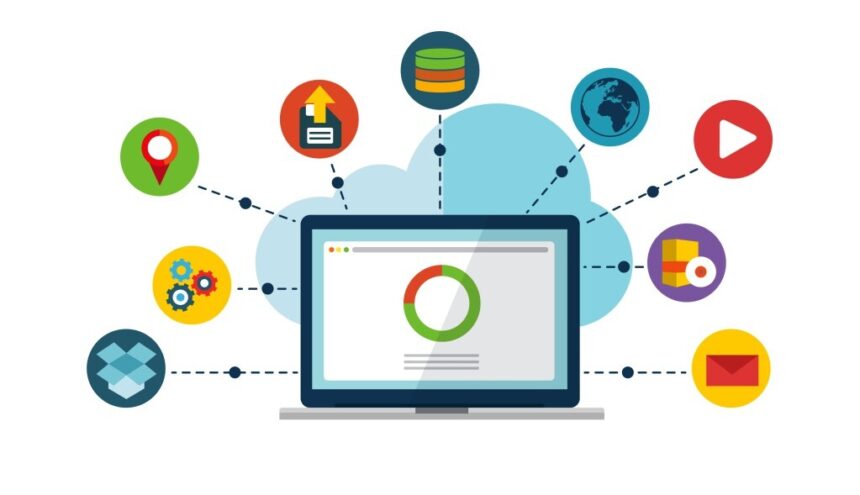You have probably heard people talking about the Cloud, but unless you use it yourself you may be unsure why it matters. Cloud services are the catch-all term for outsourced online hosting and storage services, operated through third party software that you manage yourself or employ an agent to look after. Instead of maintaining expensive servers and drives yourself (along with the specialist staff to manage them) you can instead subscribe to a Cloud service and let their secure servers handle your data and web services.
Cloud platforms and their impact on the market
With the growth of Cloud services, many competing products have appeared to manage clients’ hosting and storage problems. Early innovators in Cloud solutions, such as Amazon and Microsoft, have been joined by tech giants like IBM and Google.
Some of the leading Cloud products on the market today:
- Microsoft Azure
- Oracle Cloud
- Equinix
- IBM Cloud
- Google Cloud Platform
- Amazon Web Services
Of course, many independent local, national and international companies also offer their own Cloud solutions – or provide managed web hosting services using the leading programs above.
Amazon is the current leader, with 27.2% of the market at the end of 2015. However, many experts say the company’s head start on the others contributed greatly to this lead. Close behind is Microsoft, which claims an 11% share but has seen an amazing 100% growth.
Who is using these products, and why?
Back in 2014, data centres in Australia were generating over $800 million per year. With an 18% growth rate on average, data centre profits are expected to peak in 2016 – thanks to a sudden and sizeable demand for Cloud services. The total national revenue for data storage services is around $2 billion, and this is currently growing at around 17.2% – in line with the data centre increase.
Any business with an IT network can benefit from Cloud services – and there is an increasing consumer market for Cloud services as well. The evidence suggests more people than ever are signing up for Cloud services, but why are they doing so?
The benefits of cloud computing are particularly obvious for gambling companies like ZZZ Slots and Bet365. These companies use cloud computing to improve bandwidth and reduce time delays for customers. This has drastically improved the gaming experience, which keeps more people at the tables
How important is cost to Cloud take-up rates? Many Cloud products and services are marketed on their ability to create savings and improve returns. Outsourcing IT infrastructure costs reduces associated overheads and reduces the rate businesses pay overall. However, just 32% are looking for cost savings above all else, according to research by OZCodes. Government studies back this up, finding that the majority of companies rate other factors more highly. Ease of adoption drew in 47% of current Cloud users, while the potential productivity increase attracted 46% of those users.
Cloud productivity benefits: removing hidden costs you didn’t even know about
Downtime for a company costs an average of US$5600 (AU$7400) per minute – a six figure sum every hour. With an average of 27 hours lost in downtime each month, those costs can get very scary, very quickly. Cloud services usually carry an uptime guarantee of at least 99%. This is because Cloud data centres’ servers can be easily switched in the event of a failure, and they have failover processes to ensure that service continues smoothly without loss of data.
Why does downtime cost so much? Productivity is usually a big part of downtime losses. Web service outage stops clients buying, prevents employees from working and ties up IT staff with problem-solving and service ticket resolution. It also harms reputation among clients and cuts future revenues as a result. Moving to the Cloud prevent these costs in almost all scenarios, guaranteeing consistent service while also reducing your everyday IT outgoings.
Flexible Cloud services available
Cloud services can be used on a subscription based contract, or through a ‘pay as you go’ model. Pay-per-use Cloud is ideal for light use – it allows small businesses to step up their online services according to demand. Cloud also opens the door for more Internet of Things integration, allowing devices to connect securely across a managed network. With this flexible model, more companies can take up Cloud services at their own pace and adapt their storage strategies to suit demand as it rises.
These services can be used in conjunction with other important desktop applications to run organizations remotely. Many payroll, invoicing and time & attendance systems are compatible with many cloud services. More managers are using the cloud to remotely access these applications to handle scheduling, payroll and other important functions while they are away from their main office.
The future of Cloud services
Despite strong growth in recent years, the number of companies adopting remote storage solutions remains small. Currently, just 19% of Australian businesses are using Cloud storage and hosting – but those who are report many positive results. Only 42% of those not using SaaS and IaaS products could give a reason why; companies know they need Cloud, but haven’t yet made the switch. This is a great time for Cloud providers to step in and take advantage of the open market. We could see a huge Cloud boom during 2016 and beyond.

